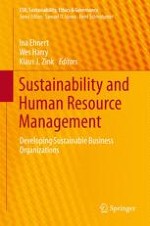2014 | OriginalPaper | Buchkapitel
Fostering Corporate Sustainability
Integrative and Dynamic Approaches to Sustainable HRM
verfasst von : Paul J. Gollan, Ying Xu
Erschienen in: Sustainability and Human Resource Management
Verlag: Springer Berlin Heidelberg
Aktivieren Sie unsere intelligente Suche, um passende Fachinhalte oder Patente zu finden.
Wählen Sie Textabschnitte aus um mit Künstlicher Intelligenz passenden Patente zu finden. powered by
Markieren Sie Textabschnitte, um KI-gestützt weitere passende Inhalte zu finden. powered by
